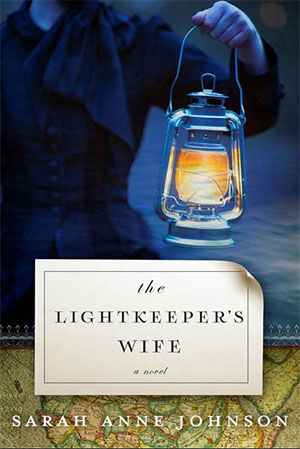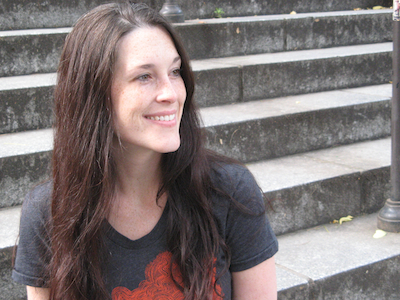An introduction to writer Sarah Anne Johnson, author of the new novel The Lightkeeper’s Wife (Sourcebooks, 2014). Her previous books include The Very Telling, The Art of the Author Interview, and Conversations with American Women Writers. An experienced author interviewer, Johnson shared that, “By asking the writers anything I wanted to know, I filled my writer’s toolbox so that the next time I sat down to write, I could address things that I didn’t have a way to look at before.”
Quick Facts on Sarah Anne Johnson
- Website: http://sarahannejohnson.com
- Home: Provincetown, Massachusetts
- Comfort food: peanut butter sandwiches
- Top reads: Emile Zola, Louise Erdrich, Anthony Doerr, Elena Ferrante, and Charles Dickens
- Current reads: Lila by Marilyn Robinson and Song of the Shank by Jeffrey Renard Allen
What are you working on at the moment?
I’m working on a novel set on Cape Cod in 1898. The main character, Sylvanius Thrasher, lives in the marsh on the outskirts of town. Through a series of events, we learn what drove him to exile himself. When a young girl is injured, he takes his first step back into the world of people he once held dear, but things are not always what they seem. Thrasher is forced to confront his past love, his father’s condemnation, and his brother’s greed in a story that explores the deep ties of family and community.
Where spurred the idea for The Lightkeeper’s Wife?
At our local historical museum, I saw a print of Grace Darling, a lightkeeper’s daughter who was rowing into treacherous seas to rescue shipwrecked sailors. There she was in her dress and petticoats doing what was considered a man’s job. I was intrigued with Grace Darling because as a child growing up on Cape Cod I had sailed with the boys. I wanted to be acknowledged for being a real sailor, but we had no female heroes. There were ship captains and pirates, but no women for me to look up to. The image of Grace Darling resonated with me—I had sailed in stormy waters, I knew how to handle a boat—and she inspired Hannah Snow.
What was your research process like for this book?
I researched women lighthouse keepers, women at sea and any women’s maritime history I could find. I visited the Highland House Museum in Truro, MA on Cape Cod where they have rooms set up from the 19th century, and there I was able to imagine the texture of a day in the kitchen, the bedroom, or the chapel. In researching women lightkeepers and women at sea, I came across women pirates, and I was intrigued. I had to explore what would drive a woman to kill and to commit heinous crimes as part of a pirate crew. My research included extensive reading of both fiction and nonfiction, visiting museums, internet searches, and talking to local people about what they knew about life along Cape Cod’s outer coast during that time period.
What do you hope readers will take away from The Lightkeeper’s Wife?
“These characters undergo circumstances
in their lives that make them question
the average way of life and lead them to grow
into new ways of making a life.”
I hope readers will take a journey with two women that have stepped outside of their gender roles during a period in history which was very different than today. In the story, Hannah and Billy thrive in situations where others may flounder. These characters undergo circumstances in their lives that make them question the average way of life and lead them to grow into new ways of making a life. I hope that readers will expand their view of gender and gender roles. I also hope that readers feel that they have had an adventure with Hannah and Billy, that they will remember the characters even after they’ve read the book.
Where and when do you prefer to write?
I prefer to write in the morning and into the early afternoon. I write in my home office because I like to roll out of bed, have a cup of coffee, and go right to the computer while I’m still in a semi-dream state. That helps me enter the dream of the novel.
Do you listen to anything while you write?
Never. I like the quiet of working at home, though I can write with a lot going on around me.
It’s been said writers can do their work from any place, where would you most want to live and write?
I love where I live. I grew up on Cape Cod and I feel at home here. It’s still very rural, and of course, surrounded by water and all the ways of life that being by the ocean brings. My request would only be that I had more time to write.
You’ve also published many interviews with writers, so did your background as an interviewer have any influence on your fiction writing?
Yes, in fact it had quite a bit of influence on my fiction writing. As an author interviewer, I read all the books and essays by the interviewee. I read anything written about them, such as reviews and other interviews. This gave me not only a deep understanding of a writer and their work, but also a sense of the arch of a writer’s work.
Most writers, over time, get better at their craft and I learned a lot by reading through all of a writer’s work in order. I could see what they were mastering with each book. I also had the chance to ask these critically acclaimed writers how they accomplished creating deep and engaging characters, rendering place, and structuring plot, for example.
How do images inform your writing?
My books often come to me in a series of images that pull at me, and I write toward those images. For example, in The Lightkeeper’s Wife, I had the image of Hannah in the boat rising on the crest of a wave. I had the image of the lifesaving rig strung up in the barn, and I could see Blue in her scarf and pants walking along the decks of the Alice K. Once I had these images, I started writing with them in mind, knowing I was moving toward something, and as I wrote, more and more came to me.
What do you find most challenging about writing?
It’s difficult to make the time to write. You have to be really disciplined and work when you don’t want to work and when you don’t have any idea about how to proceed. I also find it challenging when I have a completed draft of the manuscript and it’s time to restructure and revise to turn the manuscript into a book. This can be the most exciting part of the process, but it requires that you hold the whole book inside you so that you can feel the connections throughout the narrative.
When you’re having trouble with a story, where do you look for inspiration?
“Look away from the main action.”
Ron Carlson said that when you have trouble sit there for twenty minutes. Don’t get up to get a cup of coffee or to check the mail. Stare at that place where you’re not sure how to proceed and within twenty minutes something will come to you. That’s a discipline I enforce with myself, and it always works. The other thing I do is look away from the main action. Writer Elizabeth Cox suggested this to me and it’s helped me a lot. (For example, when two brothers are fighting vehemently about a woman and they get to a point in the conversation where you find yourself lost, have one of the characters look out the window or into the nubs of fabric on the couch and in those moments, you will often find a point of reflection or description that allows space for the real story to interject itself.) In both examples, the key is to sit with the material. Do not leave your seat!
How have your goals as a writer changed over time?
My goals have always been to explore new material and work to develop my craft. I used to work on my craft through writing exercises and through interviews with established writers, but now I spend more time reading. I read with a pencil so that I can take notes on what the writer is achieving in a sentence or paragraph or chapter, and I relate it to some issues or task I have in my own work. I read every night. I get into bed around eight o’clock and read until eleven or twelve. Sometimes I can’t turn off the light, but I have to enforce a bedtime or I won’t be able to work the next day.
“I get into bed around eight o’clock
and read until eleven or twelve.”
Is there a quote about writing that motivates or inspires you?
Eudora Welty said, “All serious daring starts within.” I love that because it reminds me that action and scene come from within the character and in order to write well, I need to be in the hearts and minds of my characters. Everything they say, do, hear, and observe is motivated by their hearts and their minds.
What advice would you give to aspiring writers?
Read, read, read as much as you possibly can, and read with a pencil handy. Make notes and think about what the writing is accomplishing under the hood, so to speak. Also, if you can reach out to an established writer, I’d advise doing an author interview or two. This is an invaluable exercise to help you learn about craft and the creative life. It also can help you increase your literary community as you connect with an author, an editor, and a literary audience.
When you’re not writing, what do you like to do?
I’ve taken up running. I find that exercise helps me get back into my body, which is important for writers, who spend a lot of time in their heads. We need to bring body and mind to the page.
About Sarah Anne Johnson
Sarah is the author of The Lightkeeper’s Wife (Sourcebooks), The Very Telling, The Art of the Author Interview, and Conversations with American Women Writers, all published by the University Press of New England. Her interviews have appeared in The Writer’s Chronicle, Glimmertrain Stories, Provincetown Arts, and The Writer. Her fiction has appeared in Other Voices, and she is the recipient of residencies in fiction from Jentel Artists’ Residency Program and Vermont Studio Center. She has taught the Art of the Author Interview Workshop at Bennington College Writing Seminars MFA Program, Lesley University MFA Program, and at literary conferences.
Buy The Lightkeeper’s Wife, preferably at your local independent bookstore.
[Toffoli, Marissa B. “Interview With Writer Sarah Anne Johnson.” Words With Writers (November 26, 2014), https://wordswithwriters.com/2014/11/26/sarah-anne-johnson.]

The Lightkeeper’s Wife by Sarah Anne Johnson.



